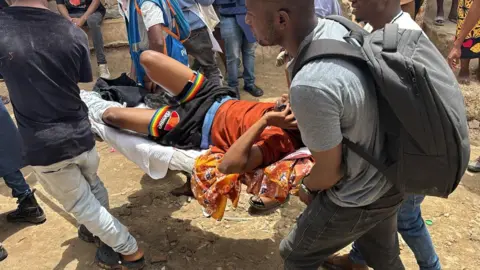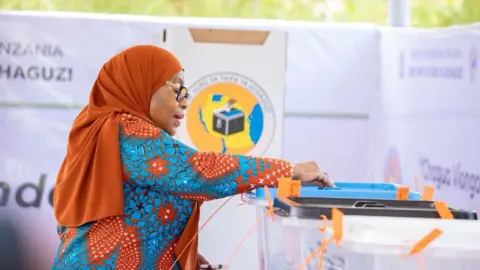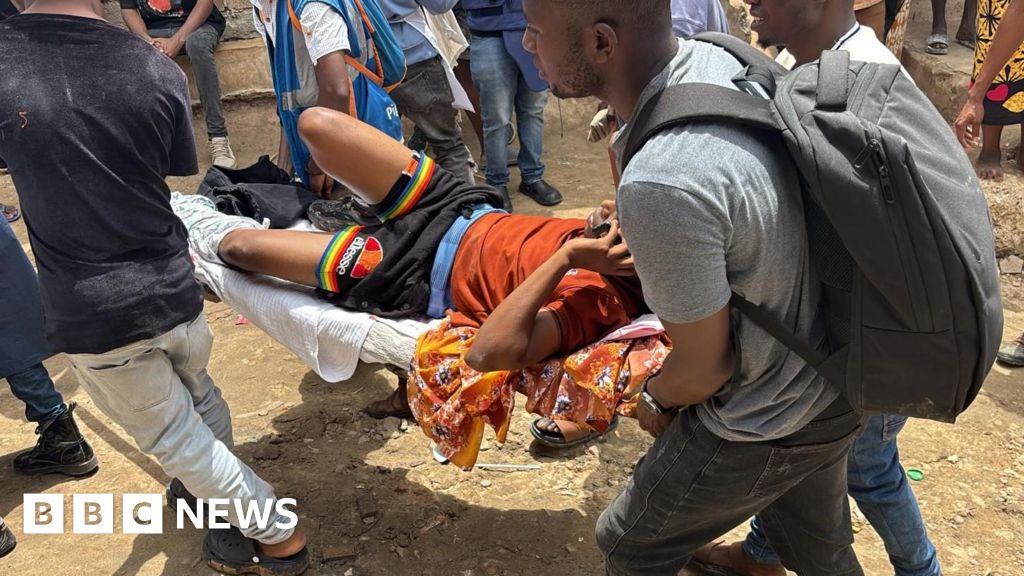Alfred Lasteck,BBC Africa, Dar es Salaam and
Basillioh Rukanga
 BBC
BBCTanzania’s authorities have imposed a curfew in Dar es Salaam, the nation’s biggest city, following violent clashes between the police and protesters on election day.
Sources at the city’s Muhimbili Hospital told the BBC they had seen an influx of wounded patients, as Tanzanians voted in presidential and parliamentary elections.
The poll is expected to be a shoo-in for President Samia Suluhu and her ruling party, as the main opposition leader is in in jail on treason charges, which he denies, and his party has boycotted the vote.
The protesters, who want electoral reforms and free political activity, set fire to vehicles and caused extensive damage to public infrastructure.
Tanzania’s chief of police, Camelius Wambura declared that curfew would start at 18:00 local time (15:00 GMT) and urged people to stay indoors. He did not say when the restrictions will be lifted.
Dar es Salaam Regional Commissioner Alfred Chalamila had earlier warned that the government would take strong action against those disrupting peace in the city.
Demonstrations were also reported in the south-western city of Mbeya and the border town of Tunduma.
“We are tired… We want an independent electoral commission so that every Tanzanian can choose the leader they want,” a protester told the BBC.
Along with the unrest of the streets, internet connectivity across the country has been severely disrupted. Global internet monitor NetBlocks described the interruption a “nationwide digital blackout”.
Reports say that voter turnout in Dar es Salaam was low when polls opened on Wednesday, with many hesitant to show up amid safety concerns.
A police spokesperson had assured the public there was no threat to their safety, saying “people should come out and vote”, according to a message posted on social media.
More than 37 million registered voters are eligible to cast their ballots in the presidential and parliamentary election.
Sixteen fringe parties, none of whom have historically had significant public support, have been cleared to contest against President Samia, who is seeking a second term.
The only other serious contender, Luhaga Mpina of the ACT-Wazalendo party, was disqualified on legal technicalities.

Samia’s ruling party, CCM, has dominated the country’s politics and has never lost an election since independence.
Ahead of the election, rights groups condemned government repression, with Amnesty International citing a “wave of terror” involving enforced disappearances, torture, and extrajudicial killings of opposition figures.
The government rejected the claims, and officials said the election would be free and fair.
Samia came into office in 2021 as Tanzania’s first female president following the death of President John Magufuli.
She was initially praised for easing political repression under her predecessor, but the political space has since narrowed, with her government accused of targeting critics through arrests and a wave of abductions.
The electoral body is expected to announce results in three days after voting ends.
You may also be interested in:
 Getty Images/BBC
Getty Images/BBC

